A century ago, John Muir asserted that “going to the mountain is going home” and that “wildness is necessity” for “tired, nerve-shaken, over-civilized people.”
And doesn’t that last phrase describe us all even more now than then?
When I was growing up in the Texas hill country, the words most often repeated at graveside funeral services were those of the psalmist of the Old Testament, who wrote: “I will lift up mine eyes unto the hills, from whence cometh my help.”
As we mourners stood in the picturesque Sabinal River Canyon, we could see blue hills against blue sky in several directions. That sight and the poetry of the familiar words comforted us.
Not all cultures through the ages have respected hilltops; John Donne is supposed to have called mountains “warts upon the landscape”. But, along with the ancients who visited mountaintops as part of a religious or ecstatic experience, many others have found both comfort and exhilaration in the heights.
What’s not to like? We gain both a view of the mountains and a view from the mountains.
Mountains serve as metaphor for both the trials we face and the heights we reach.
Sometimes the peaks are shrouded in mist and mystery.
We have a delightful array of words to describe aspects of mountains: crags, hillocks, foothills, buttes, rises, bluffs, crests.
The names of specific mountains, actual and legendary, paint rich images. Speak these names aloud, hearing them as they roll off the tongue, and think of the associations each name conjures: Olympus, Caucasus, Ararat, Sinai, Mont Blanc, Kilimanjaro, Popocatepetl, Machu Picchu.
Different shapes display their own personalities, and often it seems as though the earth itself is trying to speak to us.
Muir promises us further rewards if we can just let go of our tunnel vision and lift our eyes–and perhaps our feet–unto the hills:
Climb the mountains and get their good tidings. Nature’s peace will flow into you as sunshine flows into trees. The winds will blow their own freshness into you, and the storms their energy, while cares will drop away from you like the leaves of Autumn.
This autumnal equinox strikes me as a fitting time to lift our eyes unto the hills, when our days and nights are balanced, when the subtle change of light highlights hill against sky. There’s a brief moment of stasis, as we reach a sort of pinnacle of barely perceptible time, before we continue on toward more darkness than light.
* * * *
Photos above, starting at top, were taken at: Taylor Reservoir, Colorado; Black Canyon of the Gunnison, Colorado; Dillon, Colorado; Colorado National Monument; Shout of Relief Pass, in the Sierra Nevadas, California; Baja California Sur, Mexico.
Writing Practice:
Think of names associated with hills and mountains that are meaningful to you. Describe them.
Do you have associations with equinoxes or solstices? Do you think of the earth as it completes these cycles? Write down your thoughts.

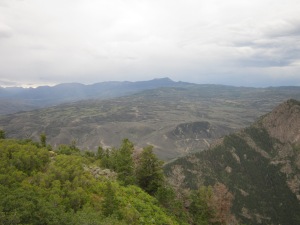
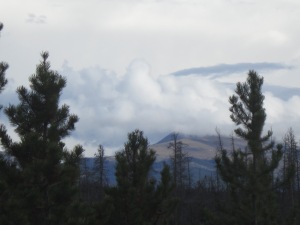
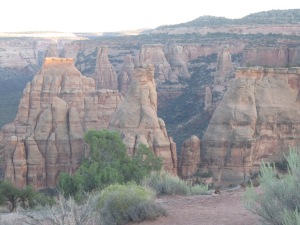
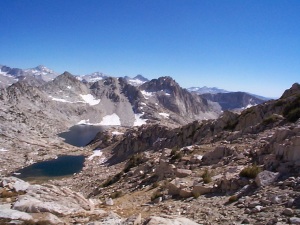
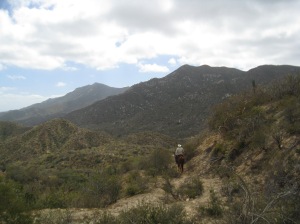
Chris, this is SO beautiful, just awesome. Thank you, thank you, thank you! I am in Montana for dreamtending, in another beautiful area of mountains. Peace, Betty
Sent from my iPhone
>
Thank YOU, Betty. It means so much to me that you read this blog. Have a wonderful time–we’ll be seeing you soon. 🙂
Near our home,Chris, is a popular place which is not a mountain, not technically a hill even I guess. My children, grandchildren, and house guests like to go to Enchanted Rock. Hearing their tales of accomplishment, being with nature, and being able panoramically see in all directions always delights me because they are so delighted. One could take your jewel of a treatise up there and re-read it aloud and most certainly read Muir’s verse. Thank you for those inspiring words to encourage me to look at the world just a little bit differently. I miss you!
It makes me happy that you enjoy my blog because I ALWAYS learn so much from you in our literature discussions. Enchanted Rock is a special place to me as well, and it represents two wonderful mountain -associated words: monadnock, which is the dome part, and batholith, which is the entire granite formation. Aren’t those great words? I think there is a Mt. Monadnock in New Hampshire that Emerson, Thoreau, and Thornton Wilder all reference in their writing. Thank you so much for reading and commenting.
I remember driving in NC and thinking there was so much smoke rising over the top ridges of the mountains and I was afraid I was in the middle of a forest fire. Then I remembered they are called the Smokies. And I finally knew why. It is lovely to see the clouds roll over and rise like white smoke. At least it was once I knew I was not going to have to run for my life!
I love the Smoky Mountains. Unfortunately, a large part of their appearance stems from pollution. Thanks, once again, Linda, for reading and commenting. I always look forward to your feedback.
Dear Chris, I love your phrase “often it seems as though the earth itself is trying to speak to us” – I believe indeed she is! Thanks for the reminder to turn our eyes to the hills for the earth’s sweet kiss of autumn. Gratefully, we have the Guadalupe Mountains right in our Texas backyard!
Thank you, Anne. I had written the entire post before adding that line. Sometimes the act of writing teaches us what we mean to say. And that, as I realize you well know, is one of the best reasons to write–to find out what we think, what we believe. Hugs to you.
Mountains, hills, and forests speak in ancient tongues, resonating with primordial mystery and wisdom which draws us into the Wild…the Wild…what our souls so crave. And, if only we can shed our cloaks of fear to allow this language to pierce our hearts and fill us with such wonder, then we shall be fit to walk among these giants. (Chris, this is the second time for me to visit your blog. The first was when I read your wonderful “Unto the Hills”. And then I thought about your words for a while and this is my response. Thanks for sharing with me! Barbara Wise
Thank YOU, Barbara. It’s a joy to read your lovely words. I so appreciate your reading and responding as well as your friendship. 🙂